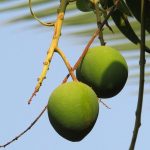The African mango, also known as Irvingia gabonensis, is a fruit native to Central and West Africa. It has been used for centuries in traditional African medicine to treat a variety of ailments, including fever, diarrhea, and dysentery. In recent years, the African mango has gained popularity in the Western world as a natural weight loss supplement.
**Nutritional Value of African Mango**
African mango is a rich source of nutrients, including:
* Fiber: African mango is a good source of both soluble and insoluble fiber, which can help promote satiety and reduce appetite.
* Vitamins: African mango contains several vitamins, including vitamin C, vitamin A, and vitamin B6.
* Minerals: African mango is also a good source of minerals, including potassium, magnesium, and calcium.
**Weight Loss Benefits of African Mango**
African mango has been shown to have several weight loss benefits, including:
* **Reducing appetite:** African mango has been shown to reduce appetite by increasing levels of leptin, a hormone that signals the body that it is full.
* **Increasing metabolism:** African mango may also help increase metabolism, which can help burn more calories.
* **Blocking fat absorption:** African mango contains compounds that may help block the absorption of fat from the diet.
**Other Health Benefits of African Mango**
In addition to its weight loss benefits, African mango has also been shown to have several other health benefits, including:
* **Reducing cholesterol:** African mango has been shown to reduce levels of LDL (bad) cholesterol and increase levels of HDL (good) cholesterol.
* **Improving blood sugar control:** African mango may help improve blood sugar control in people with type 2 diabetes.
* **Boosting immunity:** African mango is a good source of vitamin C, which can help boost immunity.
* **Protecting against cancer:** Some studies have shown that African mango may help protect against certain types of cancer, such as prostate cancer.
**How to Use African Mango**
African mango is available in a variety of forms, including:
* **Fruit:** African mango can be eaten fresh, but it is often dried or powdered for use as a supplement.
* **Supplements:** African mango supplements are available in capsule or tablet form.
* **Tea:** African mango tea is made from the dried leaves of the African mango tree.
**Dosage**
The recommended dosage of African mango varies depending on the form of the supplement. It is important to follow the directions on the product label.
**Side Effects**
African mango is generally considered safe for most people. However, it may cause some side effects, such as:
* Nausea
* Vomiting
* Diarrhea
* Headaches
* Dizziness
**Precautions**
African mango should not be used by people who are pregnant or breastfeeding. It should also be used with caution by people who have diabetes or are taking blood thinners.
**Conclusion**
African mango is a natural weight loss supplement that has been shown to have several other health benefits. It is a good source of fiber, vitamins, and minerals, and it may help reduce appetite, increase metabolism, and block fat absorption. If you are looking for a natural way to lose weight and improve your overall health, African mango may be a good option for you.

